US Reviewing EU’s Draft Agreement To Revive Nuclear Deal
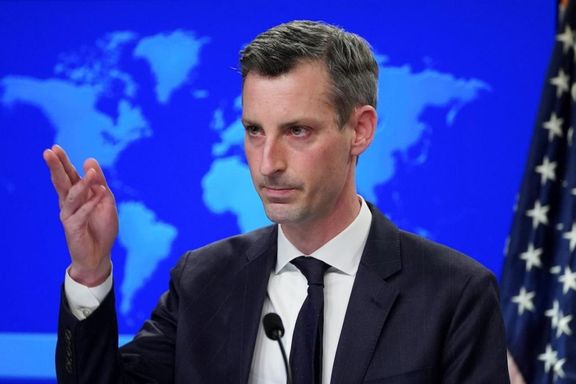
The United States says it is reviewing a draft understanding on reviving Iran’s nuclear deal that has been tabled by the European Union.

The United States says it is reviewing a draft understanding on reviving Iran’s nuclear deal that has been tabled by the European Union.
In his daily briefing on July 26, State Department spokesperson Ned Price said that “we are reviewing the draft understanding on mutual return to full implementation with the JCPOA that the high representative shared with us, as well as with Iran and the other JCPOA participants,” referring to a draft agreement by Josep Borrell, the EU high representative for foreign affairs and security policy.
About the proposal being fully acceptable to the Biden administration, he said “this new text” that Borrell referred to [in an op-ed] is based on “an outline of what we believe to be a good deal on the table since March that we have been prepared to accept.”
In an article published by the Financial Times on Tuesday, Borrell said there is “no other comprehensive or effective alternative within reach,” stressing the need for swift political decisions.
“We are studying the changes that have been proposed by the EU; we’ll respond to them in short order. And we hope that Iran finally and ultimately decides to seize the opportunity that has been before it for some time now,” he added.
Dodging a direct answer about any definite timeframe or deadline on the talks to restore the deal, Price said that “we are going to continue to pursue a mutual return to compliance with the JCPOA for as long as it’s in our interest to do so. That remains the case."
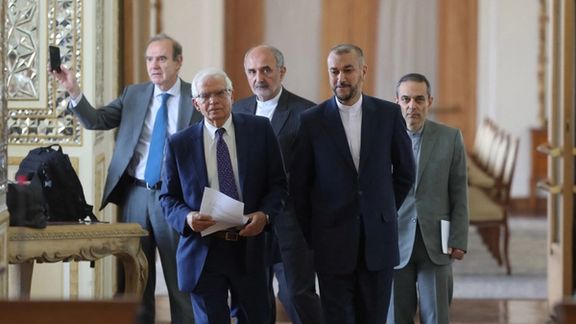
A hardliner Iranian lawmaker has warned and threatened Western countries negotiating a nuclear deal to return to the suspended talks before it is too late.
In a warning mixed with threats Iranian lawmaker Mohammad Hassan Asafari warned, "Iran's nuclear capabilities are being boosted and tomorrow would be too late for the West to return to the negotiations."
Asafari said in an interview with the government-owned Iranian Students News Agency (ISNA) that "the Western parties to the JCPOA have pushed the negotiations into a deadlock and it is in their interest to come back to the negotiating table."
The hardliner member of parliament also said: "It is a lie that it is the IRGC that prevents the negotiators from getting a result from the talks." He added: "This is not true. It is a lie told by the US side in the negotiations. What has led to the suspension of the talks is the reneging by the other side."
He was referring to numerous reports since the talks were suspended that Iran demands that the United States remove the Revolutionary Guard from its list of ‘Foreign Terrorist Organizations’.
Meanwhile, he criticized the Iranian government for not informing the parliament about where the negotiations stand, adding that the government's behavior is unacceptable.
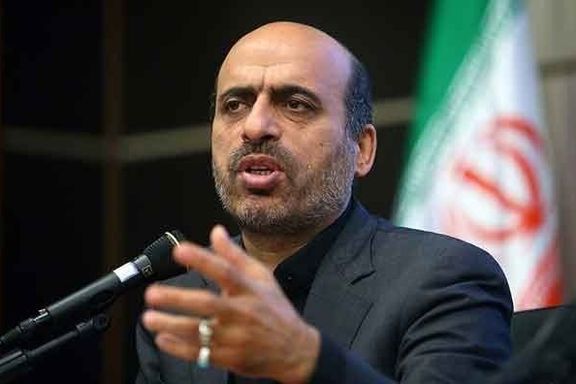
Hoever, Iranian Foreign Ministry's former director general for Middle east affairs, Ghasem Mohebali reiterated that the members of Iran's current negotiating team have always been opposed to the JCPOA. He added that recent developments in Iran including statements made by Supreme Leader Ali Khamenei's senior foreign policy adviser Ali Akbar Velayati have proven that the negotiators' objective is not to revive the JCPOA, and Tehran is no longer following that objective.
Velayati last week praised Russian President Vladimir Putin and recommended an alliance with Moscow.
Mohebali said that one of the main reasons why Iranian negotiators are not interested in telling the media about what they are doing is that they have not had any achievements and their inaction has brought the negotiations to a standstill. "They do not want to talk to the media because they do not want the public to know about their failure," he said.
The former diplomat added that members of Iran's former negotiating team were career diplomats who had a lot of experience and spoke English, while the members of the new team lack these attributes.
Mohebali further charged that the negotiating team does not have a roadmap for the talks. Asked if there is any hope for a change in this policy, Mohebali said: "Unfortunately, the government is inefficient in both domestic and foreign policy, and even in running the everyday business of its ministries. You cannot expect much from such a government." He added: "In a democratic country,” and in a democratic country they would have called for early elections.
Tehran needs political determination to revive the JCPOA, the former diplomat said and pointed out that Iran's new alliance with Russia is also a hindrance to returning to the talks.
Meanwhile, a statement made by Iran's nuclear chief Mohammad Eslami, appears to have made Iran's mixed messages to the West even more confusing. Eslami told the IRGC-linked Fars News Agency , this week that Iran will not allow monitoring cameras of the International Atomic Energy Agency (IAEA) to be turned on until there is a nuclear agreement.

The European Union foreign policy chief says the draft agreement to restore the JCPOA agreement addresses all elements with hard-won compromises by all sides.
In an article published by the Financial Times on Tuesday, Josep Borrell, the EU high representative for foreign affairs and security policy, said there is “no other comprehensive or effective alternative within reach,” stressing the need for swift political decisions “to seize this unique opportunity to succeed, and to free up the great potential of a fully implemented deal.”
Borrell said the JCPOA remains politically polarizing in Washington while the midterm elections approach as it may not have addressed all US concerns with respect to Iran, and the EU shares concerns that go beyond the nuclear issue, such as human rights and Iran’s activities in the region. “The JCPOA does not address them and was never supposed to do so. It did, however, provide the benefit of winding down the previously expanding Iranian nuclear program and opening it up to strict IAEA monitoring and inspections.”
He added that there are significant reservations over fully implementing a deal in Tehran too after the negative experience of recent years.
“The deal serves the cause of non-proliferation in return for sanctions lifting, showing that in turbulent times balanced international agreements are still possible,” he noted, saying that “Every day with no agreement in Vienna postpones concrete economic benefits to the Iranian people through substantial US sanctions lifting, as well as the benefits of non-proliferation for the world.”
Borrell also warned of “a dangerous nuclear crisis” if the deal is rejected, opening the “prospect of increased isolation for Iran and its people.”
Acknowledging the EU officials’ ideas to conclude the negotiations, Iran’s nuclear negotiator Ali Bagheri-Kani also said on Tuesday that he had serious and constructive exchanges with other sides in the past week on Vienna negotiations. “We, too, have our own ideas, both in substance and form, to conclude the negotiations which would be shared,” he added.
State Department spokesperson Ned Price in his daily briefing on July 25 said, lack of a response from Iran to the proposal made a while ago is an indication that Tehran is not serious and not ready to re-enter the JCPOA.
“And in fact, every day that they drag their feet or every day that is filled with nothing but silence on their end, it’s an indication to us that they are not serious and that they are not ready to re-enter the JCPOA on a mutual basis,” he said. US officials have maintained that an offer was made to Iran after months of talks in Vienna and so far Tehran has dragged its feet.
The comments came one day after chief of Iran's nuclear program, Mohammad Eslami said that Tehran will not allow monitoring equipment of the International Atomic Energy Agency (IAEA) to operate until the JCPOA is restored.
At the same time, the director general of the IAEA, the UN nuclear watchdog, Rafael Grossi told the Spanish newspaper El Pais on July 22 that Iran’s nuclear program is “galloping” forward. He added that enriching uranium at 60 percent is not needed if there are no military intentions, referring to Iran accumulating highly enriched fissile material that can be elevated to weapons-grade uranium in a relatively short time.
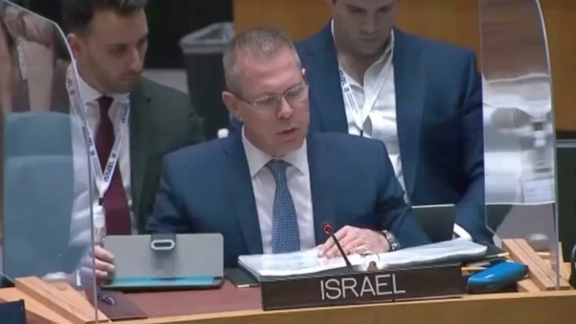
Israel’s envoy to the United Nations told Iran International that Tehran is continuing its violations of its international commitments and is getting closer than ever to a nuclear state.
Gilad Erdan said on the sidelines of a UN Security Council session that Iran is enriching uranium almost to military-grade, noting that “This is a clear threat to the security of our region and to the whole world. It needs to be addressed by this Security Council, and this Council is silent.”
Criticizing the UN Security Council’s for inaction against Tehran, he said during his address to the council, “when it comes to the situation in the Middle East everyone knows that the biggest threats to the region is the nuclearization of the radical Ayatollah regime in Iran as well as its terror funding and hegemonic ambitions.”
In an opinion piece published by the Time on Monday,former Israeli Prime Minister Ehud Barak said the efforts to block Iran from turning into a nuclear power are apparently headed for failure.
Echoing US Secretary of State Antony Blinken’s remarks eight months ago that if an agreement is not achieved within weeks, it might not be worth signing, he said that “That’s even more true today” as Iran “kept enriching uranium and has turned from a country that Russia was assigned to monitor into a country supplying Russia with armed drones.”
Defense Minister Benny Gantz said Tuesday that Israel has the ability to stop Iran’s nuclear development or merely delay it, noting, “Iran is a global problem. It is not just Israel’s private problem.”
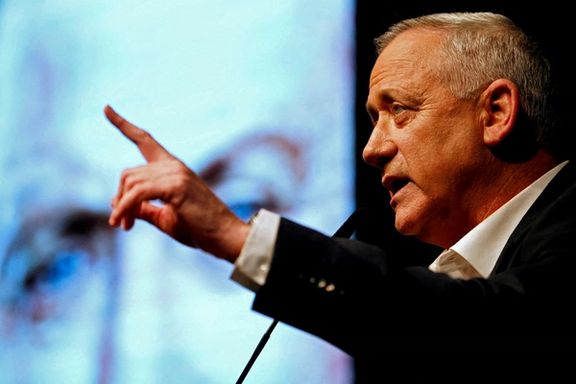
Former Israeli Prime Minister Ehud Barak says the efforts to block Iran from turning into a nuclear power are apparently headed for failure.
In an opinion piece published by the Time on Monday, Barak said the nuclear agreement – or the JCPOA – failed to delay Iran from having enough highly enriched uranium for nukes, and the 2018 US withdrawal from that same agreement allowed Iran to "legitimize” its progress toward "threshold nuclear" status. “In 2018 they were some 17 months away from that threshold. Today they are probably just 17 days away.”
Echoing US Secretary of State Antony Blinken’s remarks eight months ago that if an agreement is not achieved within weeks, it might not be worth signing, he said that “That’s even more true today” as Iran “kept enriching uranium and has turned from a country that Russia was assigned to monitor into a country supplying Russia with armed drones.”
Describing a new agreement as mainly aimed at keeping for appearances, he said such a deal provides “both sides a ‘denial umbrella’ for domestic needs — for the US, avoiding tougher realities and choices, and, for the Iranians, keeping sanctions at the lightest level possible.”
Noting that Iran will turn into a de-facto threshold nuclear state this summer, he said, “Both Israel and (for sure) the US can operate over the skies of Iran against this or that site or installation and destroy it. But once Iran is a de-facto threshold nuclear state this kind of attack simply cannot delay the Iranians from turning nuclear.”
Defense Minister Benny Gantz said Tuesday that Israel has the ability to stop Iran’s nuclear development or merely delay it, noting, “Iran is a global problem. It is not just Israel’s private problem.”
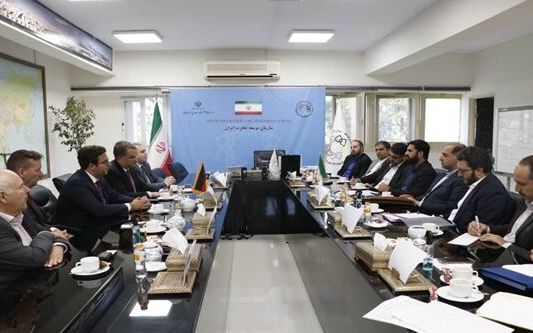
Iran says German businesses seek to expand their activities in the Islamic Republic through participating in Iranian trade exhibitions.
Chairman of the Board of the German Federal Association for Economic Development and Foreign Trade (BWA) Michael Schumann attended a meeting with Iranian lawmaker Ehsan Ghazizadeh Hashemi and Iran's ambassador to Germany Mahmoud Farazandeh as well as Alireza Peyman-Pak, the head of Iran’s Trade Promotion Organization on Tuesday.
According to the Iranian government’s website IRNA, Schumann said trade relations with the Islamic Republic can be expanded regardless of political issues. He welcomed the establishment of the Iranian trade center in Berlin, and called for allocating more space to German businessmen at expos in Iran.
The report quoted him as saying that sanctions imposed on the Islamic Republic have proven to be more detrimental to the German businessmen than their Iranian counterparts.
On July 21, the British ambassador to Iran also highlighted business opportunities to boost UK-Iran trade regardless of the result of the talks to restore the 2015 nuclear talks, known as the JCPOA (Joint Comprehensive Plan of Action). “Just back from Shiraz with our Trade Team... Plenty of great companies in Fars, with opportunities for quality UK products & services to boost UK-Iran trade, JCPOA or not,” Simon Shercliff tweeted.
Asked during a briefing about the British Ambassador’s remark, Spokesperson Ned Price referred to shared goals with European allies to uphold US sanctions until there is anuclear agreement with Iran.